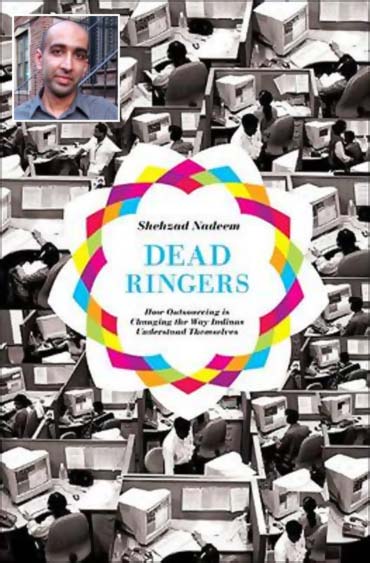
From compulsory drinking binges to confused parents, a new book throws interesting light on India's outsourcing industry, discovers Aseem Chhabra.
As a doctoral student in sociology at the University of California, San Diego, Shehzad Nadeem was interested in issues related to culture, labour and globalisation. In 2005 he set out to India to research on the call centres or BPOs -- Business Process Outsourcing centers -- that had been creating a lot of buss in the West, as well as in India.
"So much was written about the industry in articles and there were documentary films on the subject saying look what is happening in India," says Nadeem on the phone from his home in New York City. Now an assistant professor of sociology at the City University of New York's Lehman College, he is the author of a recent book, Dead Ringers: How Outsourcing Is Changing the Way Indians Understand Themselves.
"They talked about the accent correction classes and the cultural impact of the outsourcing on the lives of the young employees of these companies," he adds. "A lot of it was people defending or criticising the industry -- in both cases very stridently -- and I wanted to investigate in a more sustained, balanced manner what was happening."
Dead Ringers, which examines all sides of the outsourcing equation, is a very well written and thoroughly readable book.
"When I was in grad school I spent a lot of time reading very smart but dry papers," says the Virginia-born Nadeem. "So I realised that if you are spending all this time writing, then you might as well write to be read!"
Before his PhD from the UCSD (University of California, San Diego), Nadeem earned his undergraduate degree from James Madison University in Virginia. The research trips for Dead Ringers were his first to India. His Delhi-born father migrated to Pakistan after partition in 1947 and later moved to the United States. Nadeem's prior trips to South Asia were to visit relatives in Pakistan.
His interest in writing the book also stemmed from the globalisation story in India.
"The normal globalisation story is about manufacturing jobs, about people who might not have had jobs had it not been for globalisation," he explains. "They could have been working in smaller companies or were unemployed people who could be picking up trash that was recyclable. So, when these multinationals came, they provided jobs in the Philippines or Indonesia, etc."
But India's experience was different.

As surveys in India indicate, the outsourcing industry draws its workforce from the privileged castes and classes, not landless peasants,' he wrote in the book's introduction. 'These young and college-educated workers would easily have worked even without outsourcing.'
As he entered the world of call centres in India, he says he was somewhat unsure about which side to take in the globalisation debate. "I think it is healthy to go into the project when you are not entirely sure where you stand," he says.
His goal was to study the culture of the outsourcing companies, which he describes as a new industry in India.
"You have the importation of a lot of different managerial styles, a very young work force and not a lot of expertise at the middle management level," he says.
Another goal was conditioned by what he says is his Western or US bias.
"I wanted to look at the labour conditions, and what happens when these jobs leave the US. Do we have the same working conditions or are they more challenging?"
Dead Ringers is packed with interviews at the four call centres that Nadeem explored. He changed the identity of his interviewees, but was surprised by the openness of the workers, especially in being critical about the management. He found subjects for interviews through managers, in canteens where the workers hung out during their breaks. He also met them after work at bars, where they were even more candid. He spoke to human resources specialists who were coping with a market where there was shortage of workers, trade union leaders, and even managers in the US.
The book presents a mosaic of the lives of call centre employees -- taking on a Western persona and sometimes living with it at all times, long work days and nights, relatively new, Western work conditions, mandatory partying at clubs after work, lack of upward mobility and a high burnout rate.
During the research there were issues that surprised Nadeem. He outlines some in a chapter titled 'Macaulay's (Cyber) Children'. There, he highlights the efforts of human resources managers to retain the young employees in the face of high turnover.
"They were completely confused as they talked about the attrition," he says. "They didn't know how to stop it, especially since it was a seller's market. They would do kind of weird things such as throwing parties, taking workers out drinking to bars. In some ways there was a connection with Japan where salaried employees are expected to go out with colleagues for after-work drinking. But in India this was more like a perk."
He continues: "A lot of companies perceived the workers as very young and kind of immature and they thought they could cater to their base instincts. It was believed that if you help them party then they would want to stay. The next time I go to India, I am curious to see how much of it still goes on because I do not think it helps reduce attrition. Everybody was doing it and so no company was standing out."

At the beginning of the chapter, Nadeem describes one such party after which a manager takes a drunken female employee to her house and leaves her with her confused mother. He was with the group and rode in the van, so he witnessed the awkward encounter between the manager and the girl's mother.
"It was a strange situation," he says. "You had a lot of rapid changes and a lot of insecure parents who didn't know what was happening. Here's a new industry that was prising their young ones away from them, placing them in co-ed work places. They worked at night, they went to pubs and so a lot of parents felt that the workers were getting Westernised."
But there is an irony in what Nadeem describes as a Bollywood movie situation. While many parents may have been initially shocked, they also appreciated the high salaries the college graduate children were earning at the call centres.
"The money is what turned the parents to open to some of these things," he says.
But in the early days of this industry, some companies would organise regular tours for the parents to ease their concerns about the work environment.
There were other cultural concerns about working in call centres.
"Earlier, people in the neighborhood would look at the young workers in a weird way," Nadeem says. "They would refer to call centre girls as call girls. Even a male employee I talked to said that for him the prospect of having an arranged marriage was difficult."
How candid some of the executives and managers were with him surprised Nadeem. There was frustration with the slow growth in the infrastructure, lack of government response and the fear that the call centres jobs might move to other countries like the Philippines, which has a relatively large, young, educated and English-speaking population.
"One manager said to me what we need in India is a dictatorship and then we can come back to democracy," Nadeem says. "He said it in a bit off-handed joking manner, but there was some seriousness to that issue. There was a belief that China was able to do these things very easily and here we had to bumble through the nuisance of democracy. Some of these managers had the class privilege, having been trained in the West for part of their working life. And they felt frustration with how slow things could be in India."
Nadeem observed other things too, such as the obsession of the young workers to emulate what they thought was an American lifestyle. He recalls visiting a complex in north Mumbai, with giant office and apartment towers.
"People had a lot of disposable income and you would think they would want to sample cuisine from the rest of the world," he says. "But the restaurants they had were Ruby Tuesdays and TGI Fridays. There was gravitation towards the emblems of American culture. They looked at this as a mark of modernity, but also a mark of what separated them from other Indians. They operated in this weird social world where they were often out of step with the rest of society."
But things are changing in the outsourcing industry. Many companies now do not insist that workers learn to speak with American accents or take on Western names. Some of it has to do it with the situation in the US, where more and more Americans are beginning to accept that call centres for their credit cards and other businesses are often located in India.
"But this change is not across the board," Nadeem says.
"Another change I notice is that with the recession, it is no longer the seller's market," he adds. "The line of those who want jobs is becoming longer."

Nadeem points out in his concluding chapter that the market liberals believe they have won the outsourcing debate. He quotes one executive as saying: 'The backlash is over. It's finished.'
Nadeem also points to the great class divide and inequalities in India.
'The unevenness of the globalisation is nowhere more evident than in its differential impact of urban and rural areas,' he writes in the concluding chapter. In 2006, India Today reported that wages were on rise in the outsourcing sector and information-technology professionals would be given a Mercedes as bonus and incentives. But in 2008, over 16,196 farmers committed suicide.
'It is almost as if the reportage is of two different countries,' Nadeem writes. 'One in which the skyscrapers of the "sunrise sector" point towards the heavens and another in which gases are directed humbly downward to the barren soil.'
He also sees room for humour in the outsourcing business. Last fall, he eagerly awaited the opening season of the NBC sitcom Outsourced. Initially, he was disappointed.
"I was talking to my parents about this recently," he says laughing. "I felt that the show had all the stereotype characters. I wish a show like this had developed three-dimensional characters. But then I realised that it is a sitcom and in order for the show to appeal to the lowest common denominator they do have to make the characters more two-dimensional."